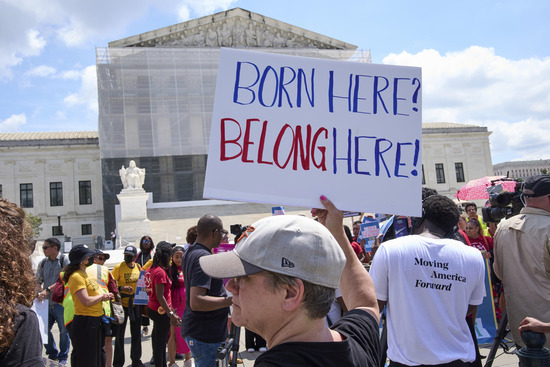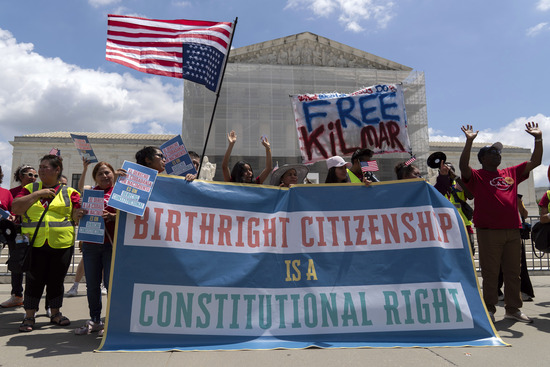Supreme Court argument on birthright citizenship shouldn’t be happening
Thursday’s oral argument at the Supreme Court over President Donald Trump’s blatantly unconstitutional executive order ending birthright citizenship should never have happened.
There’s no credible debate over birthright citizenship, despite right-wing attorneys and law professors desperately trying to gin up support. Before Trump, the only people talking about ending birthright citizenship included the likes of John Eastman, who is currently facing disbarment for his role in trying to overturn the 2020 election.
If you tuned in on Thursday, you might have wondered why they weren’t discussing the constitutionality of birthright citizenship. Instead, much of the argument was about the nationwide injunctions that lower courts have issued blocking Trump’s executive order.

Republicans used to love broad injunctions. They had no problem with Judge Reed O’Connor’s nationwide rulings blocking Obama-era rules about letting students use bathrooms that conform to their gender identity, nor were they sad when he invalidated a Biden-era gun regulation nationwide, nor did they express consternation when O’Connor struck down preventive care requirements under the Affordable Care Act and, you guessed it, applied that nationwide. They also had no problem with Trump appointee Matthew Kacsmaryk deciding to block the sale of mifepristone—a completely legal drug used in medication abortions—nationwide.
In contrast, when nationwide injunctions restrain their Dear Leader Trump from shredding the Constitution, Republicans think that is very unfair, and those judges should be impeached. So, Trump ran to his reliable pals on the Supreme Court to beg them to limit any injunctions against his birthright citizenship order to the plaintiffs named in various lawsuits or only to the states that challenged the order.
It doesn’t take a keen legal mind to see why limiting the reach of an injunction is absurd in the context of birthright citizenship. The administration proposes a patchwork of nonsense, where a child born to noncitizen parents would still be a citizen in, say, New York, but would not be a citizen in Texas. That’s untenable and unworkable.
Related | These Democrats are uniting against Trump’s birthright citizenship ban
There’s also the fact that the administration has no actual, coherent legal theory about why Trump gets to upend the 14th Amendment’s citizenship guarantee. He wants courts to let him begin deporting people while litigation is pending. Duing oral argument his Solicitor General John Sauer whined about how unfair it is that Trump keeps losing, complaining that “repeatedly, 40 times in this administration, we’re being enjoined against the entire world.” Most lawyers would see this string of losses and realize that their client’s position is wrong, but for Sauer, it’s the courts that must be wrong.
Sauer tried to tell the court that the best way for this to be handled is to have multiple lower courts review the constitutionality of the birthright executive order, or what he pompously called “the appropriate percolation that goes through the lower courts.”
It’s rich for Sauer to argue this, given that he represents an administration constantly asking the Supreme Court to let him short-circuit the normal litigation process so he can do what he wants while a case proceeds.
You might remember Sauer as the lawyer who represented Trump before the Supreme Court in his successful bid for sweeping immunity from prosecution. Much like Trump’s other criminal defense attorneys, Todd Blanche and Emil Bove, Sauer was rewarded with a high-level administration job for his efforts.

Sauer couldn’t adequately explain exactly how the millions of people who would be rendered noncitizens could appropriately challenge this in the courts. He floated the idea that perhaps plaintiffs could bring a class action suit, but under questioning from Justice Elena Kagan, admitted the administration would likely oppose any class action efforts.
Requiring plaintiffs to bring individual suits also makes no sense when the underlying question is purely whether the executive order is unconstitutional. Justice Sonia Sotomayor pointed this out to Sauer, saying, “It’s a pure legal question: What does the Constitution mean with respect to citizenship. There are no individual facts that would alter our conclusion.”
Sauer was also blissfully unperturbed by the consequences of letting Trump deport people right away if the Supreme Court ultimately rules, years later, that the birthright citizenship executive order was unconstitutional. When Justice Kagan asked him what to do about the “untold number of people who, according to all the law that this Court has ever made, ought to be citizens but are not being treated as such” his blithe answer was just that any time, those plaintiffs can come forward and seek individual relief. He also said they could do so on a class-wide basis, perhaps forgetting he’d already declared the administration would oppose that.
So, the administration’s preferred solution here is to just start deporting babies or whoever, but only from states that didn’t sue over it, and anyone who wants to fight back has to sue the government individually. Besides being wrongheaded, it would basically grind the federal court system to a halt as thousands or even tens of thousands of individual cases get filed in multiple jurisdictions. One can almost hear Sauer whining about how hard and unfair that approach would be too, what with requiring the administration to defend its position in courts across the country.
Related | How fear becomes a birthright
Unfortunately, it looks like Trump has at least five justices who could be willing to grant his request to block the nationwide injunctions. Justices Neil Gorsuch and Clarence Thomas have already expressed their opposition to them.
The Supreme Court should not have rewarded the administration’s behavior by taking up the case. That’s especially true because the administration deliberately did not ask the court to address the merits of the case: whether the executive order is constitutional. The administration knows full well that it might not like the answer to that question. Instead, it focused on the procedural issue, trying to chip away at lower court rulings,
So what happens if Trump wins here? He presumably would get to start stripping citizenship from people in bits and pieces across the country, despite there being no ruling anywhere saying that the executive order is constitutional. Sure, they would get their citizenship back if one day, years from now, the Supreme Court finally rules against the administration on a fully litigated case about birthright citizenship. But by then those people would be gone, deported, scattered, and stripped of the life they had here. That’s an actual, grievous harm, whereas the only harm the administration is facing is that they might have to wait a wee bit longer to start kicking citizens out of the country.
Allowing a debate over this, as if those things were equal concerns and equivalent harms, is shameful. But we know by now that much like Trump, the conservatives on the court have no shame.
